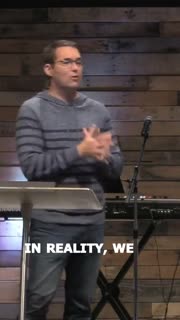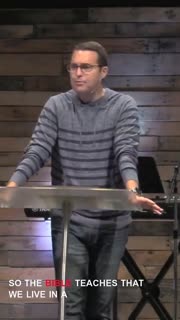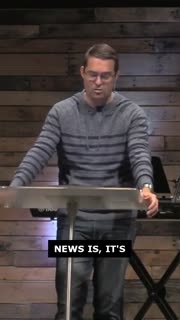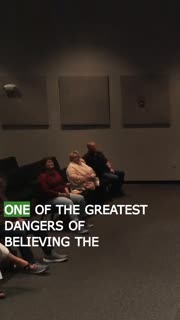Relying on God: The Truth About Self-Help
Devotional
Sermon Summary
Bible Study Guide
Sermon Clips
1) "What we concluded was, in reality, we were all given more than we can handle, right? We've all been given more than we can handle in this life. But what does that do? That forces us to rely on the power and the presence of God. We are very inadequate in and of ourselves to navigate this, life successfully, but when we trust in the presence and power of God, anything is possible. Amen?" [50:14] (22 seconds)
2) "So the Bible teaches that we live in a world of sowing and reaping. And let me be very clear, guys, again, karma is a big word, hot word today. We are not talking about karma. It is God's law of sowing and reaping. It's where karma came from, that whole idea for karma, right? But God's law of sowing and reaping is not karma. It's a biblical law of the universe that God set in motion. We have the ability to act and to react. How many of you know that we got to be just as careful how we react as to how we act, right?" [01:13:09] (33 seconds)
3) "What I'm thoroughly convinced of is this. We've got to tear down this false image of us looking to be the judge of who is and isn't worthy of God's help. Because every single human being that we encounter, we're not worthy of God's help. We're not worthy of God's help. We're not worthy of God's help. We're not worthy of God's help. You know, every single human being that you encounter in this life is a living expression of God's creative joy. Every single human being. Every single human being you encounter, they were, God breathed the breath of life into their lungs. Every human being that you encounter is deeply cherished by God." [01:23:03] (35 seconds)
4) "And the good news is, it's not God alone who's wanting to help people. He wants to partner with us, his people, in this process of helping people. It's God helping people. It's always been a part of the mission of how people have learned to surrender their lives to Jesus and become more like him." [01:24:32] (21 seconds)
5) "One of the greatest dangers of believing the statement, God helps those who help themselves, is a tendency toward hyper-independence. That is our society today. It's like our belief that when push comes to shove, the only person I can depend on is me, myself, and I. And guys, again, that is not the way of the kingdom that we're from. That is not the way of the kingdom of God. We all need the Lord. We need his presence. We need his power. We need each other." [01:31:13] (28 seconds)
6) "I think it's time to quit asking, does God help those who help themselves and instead just choose to do good? Because that's what Jesus did. Amen?" [01:39:31] (10 seconds)
Ask a question about this sermon
2) "So the Bible teaches that we live in a world of sowing and reaping. And let me be very clear, guys, again, karma is a big word, hot word today. We are not talking about karma. It is God's law of sowing and reaping. It's where karma came from, that whole idea for karma, right? But God's law of sowing and reaping is not karma. It's a biblical law of the universe that God set in motion. We have the ability to act and to react. How many of you know that we got to be just as careful how we react as to how we act, right?" [01:13:09] (33 seconds)
3) "What I'm thoroughly convinced of is this. We've got to tear down this false image of us looking to be the judge of who is and isn't worthy of God's help. Because every single human being that we encounter, we're not worthy of God's help. We're not worthy of God's help. We're not worthy of God's help. We're not worthy of God's help. You know, every single human being that you encounter in this life is a living expression of God's creative joy. Every single human being. Every single human being you encounter, they were, God breathed the breath of life into their lungs. Every human being that you encounter is deeply cherished by God." [01:23:03] (35 seconds)
4) "And the good news is, it's not God alone who's wanting to help people. He wants to partner with us, his people, in this process of helping people. It's God helping people. It's always been a part of the mission of how people have learned to surrender their lives to Jesus and become more like him." [01:24:32] (21 seconds)
5) "One of the greatest dangers of believing the statement, God helps those who help themselves, is a tendency toward hyper-independence. That is our society today. It's like our belief that when push comes to shove, the only person I can depend on is me, myself, and I. And guys, again, that is not the way of the kingdom that we're from. That is not the way of the kingdom of God. We all need the Lord. We need his presence. We need his power. We need each other." [01:31:13] (28 seconds)
6) "I think it's time to quit asking, does God help those who help themselves and instead just choose to do good? Because that's what Jesus did. Amen?" [01:39:31] (10 seconds)






